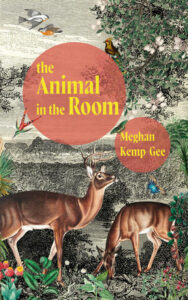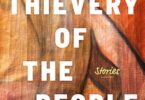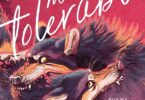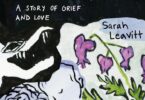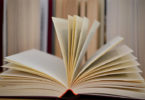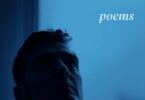Meghan Kemp-Gee, The Animal in the Room (Coach House Books, 2023), 80 pp., $23,95.
As a poet who is always interested in incorporating animals into my poetry—as they lend themselves particularly well to vivid imagery and nuanced metaphors—my curiosity was instantly piqued when I came across Meghan Kemp-Gee’s debut collection, The Animal in the Room. I was further captivated as I made my way through this thoughtful and keen exploration of human experiences, interpreted through a wonderfully crafted poetic bestiary.
From wolves handing out resumés, to quiet observations on the feeding habits of deer ticks, throughout the collection we witness not only Kemp-Gee’s insightful use of animals as a way to explore human behaviour, but also the way our gaze towards animals can be turned inward. This makes humans the most animal in any room, prone to the same inquisitive study we apply to the rest of the animal kingdom.
While Kemp-Gee’s quiet observations showcase the unique behaviors of different creatures by anthropomorphizing them, it is the speaker’s interactions with these creatures that skillfully add a layer of curiosity:
“…something with cloven feet / and big bad teeth crawls in quadruped from Main Street … / It has come to watch the [yoga class] and ask us some questions / about exactly what kind of experience it is supposed to have” is how the narrative of “Disappointment at 10 A.M.” unfolds for an unknown creature. In “The Wolf Returns Your Call,” the speaker relays that “[the wolf] wants to know what / you mean when you say / seem. For example, / when they say that You don’t seem like yourself, / it does not know what / seeming is, so it / can’t tell.” These excerpts are just a few examples of how Kemp-Gee brilliantly reverses the interrogative lens we as humans have on animals. By making both known and unknown creatures embody human curiosities, they are the one asking us for once what it is their purpose is. This simple but effective reversal is one of the keystones of Kemp-Gee’s collection, indicative of a refined awareness that a need to understand and comprehend a being’s place in the world begins with questioning what is considered “natural.”
When something with cloven feet desires to know what it should be experiencing (i.e., feeling) it raises the concern that even though a creature cannot be classified as recognizable, it still contains an innate sense of comprehending what it is. This echoes a very human instinct to classify in order to understand the natural world. Relatedly, the wolf in “The Wolf Returns Your Call” poses questions about how feelings affect the way we portray our external selves as humans; how we go about our lives. Similar to the way humans observe animals, speculating their behaviours as stemming from what they could possibly feel, Kemp-Gee turns this observation onto us, prompting us to reflect on the ways our behaviour is steered by our emotions, desires, and needs.
While these moments showcase creatures exemplifying human inquisitiveness in order to reflect our own need to satisfy our curiosity, there are equally intriguing poems where it is not blatantly clear whether or not the speaker is human or wild animal. This makes for a more nuanced reading. One such poem is “Whoso List III,” whose narrator teases readers with recognizably human moments such as bringing an extra copy of a resumé, before switching to something more animal a few lines later: “…I am going hunting, I am playing my old / hunting games again. I will look it in the eyes. There, / I will rediscover exactly what I am.” One could argue that searching for a job is equivalent to an animal hunting for nourishment, which is another way of reading Kemp-Gee’s collection as one where even though we are all human, we are in a sense still animals searching and hunting for avenues of survival.
The theme of work permeates the collection as a part of a reflective human journey, told in the comforting, gentle, and informative tone of nature documentaries. One poem that does this particularly well is “The Thesis Sentence.” Written as a block of text without any distracting line breaks, the speaker narrates in a rather pragmatic way the merits and conclusions of a piece of writing: “Through her syntax and diction, the author explores her main theme in / a clear and effective way…Through- / out this poem, the meaning is reflected by the form in several ways…Overall, in this poem, / the meaning is enhanced and emphasized through the poet’s use of / form” and so forth.
The subject of “The Thesis Sentence” is being spoken about as if they were an animal being observed in their natural habitat—an ethos that Kemp-Gee cleverly establishes for the poem, and similar ones like it. She showcases how our own habits, decisions, and implementation of knowledge is reflective of behaviour that is innately animal and can be observed as such, making us once again, the animals in the rooms of our existence.
All of these poems’ comfortably slow, observant, and drawn-out narratives are where Kemp-Gee excels in creating a collection where each poem fits so naturally with the next, that they all form an environment that sustains her keen perspective on being human. Each page is a room of human experience. Each poem is a quiet animal in its own habitat that Kemp-Gee invites us to quietly observe, and to seek out how much of ourselves is reflected in them. Read too quickly, and you risk having the meaning run away from you like a startled deer.
The Animal in the Room is a collection worth sitting with, one that opens new doors of appreciative understanding of the uncertainties of being human through the eyes of animals who share our anxieties. Like the unknown creature wondering what kind of experience it is supposed to have, we too can ponder this without fear, but with Kemp-Gee’s assurance that “every room you will ever be in / will be a new brave-peopled world” full of others who are asking themselves the same question.
…
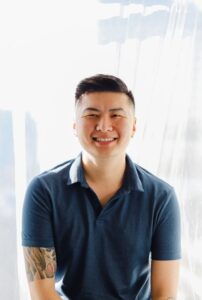 David Ly is the author of Mythical Man (2020), which was shortlisted for the 2021 ReLit Poetry Award, and Dream of Me as Water (2022), both published under the Anstruther Books imprint of Palimpsest Press. He is also co-editor (with Daniel Zomparelli) of Queer Little Nightmares: An Anthology of Monstrous Fiction and Poetry (Arsenal Pulp Press, 2022). David’s poems have appeared in publications such as Arc Poetry Magazine, Best Canadian Poetry, PRISM International, and The Ex-Puritan, where he won the inaugural Austin Clarke Prize in Literary Excellence. David is the Poetry Editor at This Magazine.
David Ly is the author of Mythical Man (2020), which was shortlisted for the 2021 ReLit Poetry Award, and Dream of Me as Water (2022), both published under the Anstruther Books imprint of Palimpsest Press. He is also co-editor (with Daniel Zomparelli) of Queer Little Nightmares: An Anthology of Monstrous Fiction and Poetry (Arsenal Pulp Press, 2022). David’s poems have appeared in publications such as Arc Poetry Magazine, Best Canadian Poetry, PRISM International, and The Ex-Puritan, where he won the inaugural Austin Clarke Prize in Literary Excellence. David is the Poetry Editor at This Magazine.

